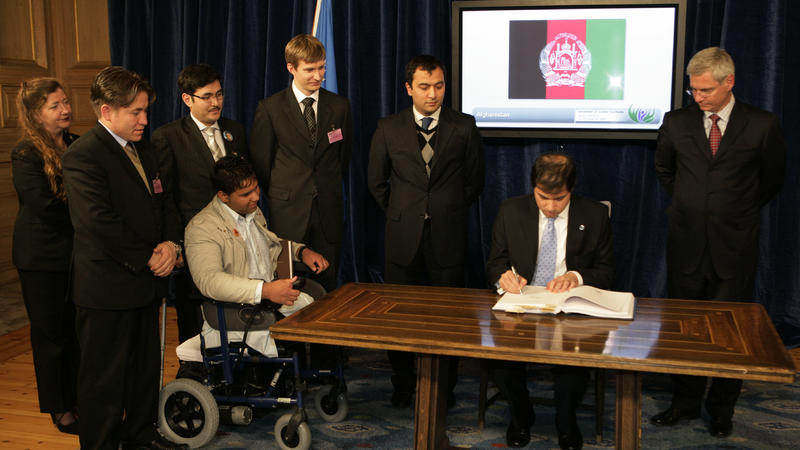Afghanistan, which has suffered greatly from the use of cluster munitions, deposited its instrument of ratification to the 2008 Convention on Cluster Munitions with the United Nations in New York on September 8, becoming the 62nd state party to the ban convention.
In a statement welcoming the ratification, Human Rights Watch remarked that Afghanistan signed the convention "despite heavy pressure from the U.S. not to and now it has ratified despite continued U.S. opposition to it.”
U.S. Department of State cables made public by Wikileaks in 2011 have shown how U.S. officials sought to influence the Afghan government against signing the convention it signed in Oslo, Norway on December 3, 2008, after a directive from President Hamid Karzai. The signature was a surprise at the time as Afghanistan did not participate in the negotiations of the convention and had indicated it would not be able to sign.
The night before the signature, Afghanistan's Ambassador Ludin had met with Afghan campaigners, including survivor Soraj Ghulam Habib, who pressed him to revisit the decision not to sign. In a statement to the signing conference the next day, Ambassador Ludin said Afghanistan's decision to sign was in “recognition of the plight of the thousands of victims of cluster munitions in my country…. The decision is, above all, a tribute to the victims of cluster munitions in Afghanistan and around the world.”
Between October 2001 and early 2002, U.S. aircraft dropped 1,228 cluster bombs containing 248,056 bomblets in 232 strikes on locations throughout the country. Soviet forces also used cluster munitions during their invasion and occupation of Afghanistan from 1979 to 1989, while a non-state armed group used cluster munitions during conflict in the 1990s.
It is not believed that there has been any use of cluster munitions in Afghanistan since 2002, although some Coalition forces have acknowledged deploying cluster munitions to Afghanistan for possible use.
Afghanistan's ratification comes days ahead of the Second Meeting of States Parties to the Convention on Cluster Munitions, which Lebanon is hosting in Beirut on September 12 -16. The U.S. is not expected to attend the meeting, even as an observer.
For more information, see:
- Human Rights Watch, "Afghanistan Ratifies Global Ban on Cluster Bombs" (Sep. 13, 2011)
- Cluster Munition Monitor 2011 - profile on Afghanistan (Aug. 25, 2011)
